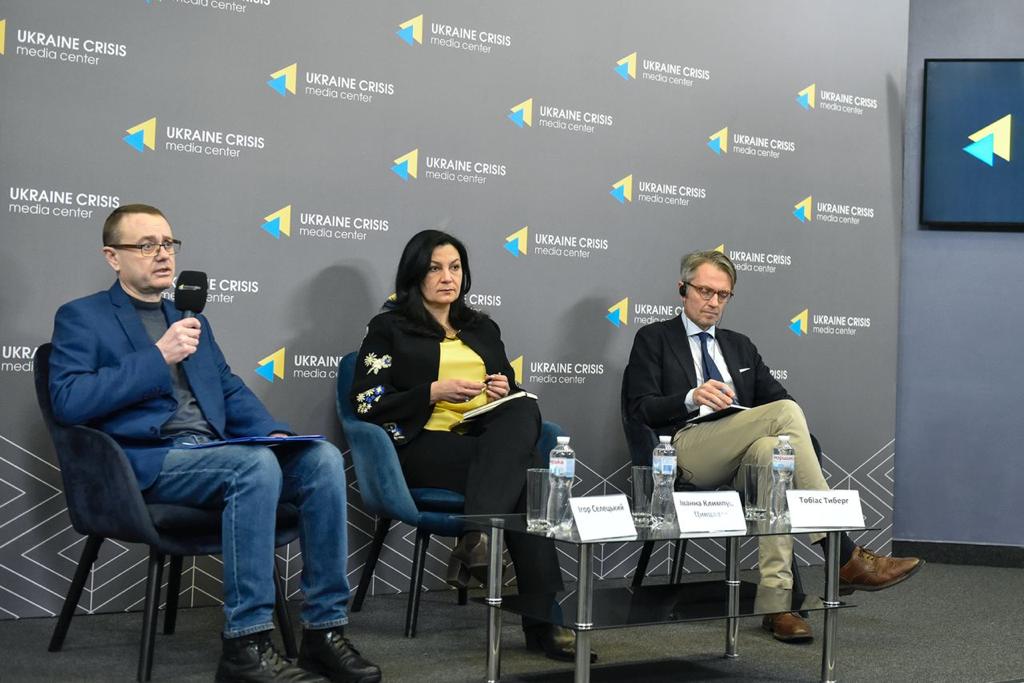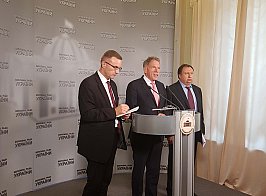Home >
All publications
International activity
06 February 2023, 10:40
 The Chair of the Committee on Ukraine's integration into the EU
participated in the round table ‘Ukraine-EU Summit: public and
behind-the-scenes dimensions’. Swedish Ambassador to Ukraine Tobias Tyberg
and journalist Vitaly Portnikov also took part in the discussion.
The Chair of the Committee on Ukraine's integration into the EU
participated in the round table ‘Ukraine-EU Summit: public and
behind-the-scenes dimensions’. Swedish Ambassador to Ukraine Tobias Tyberg
and journalist Vitaly Portnikov also took part in the discussion.
Ivanna Klympush-Tsintsadze noted that Ukraine participated in the 24th Ukraine-EU summit as a candidate country for the first time. And this is a completely different level of relationships, expectations and responsibility. According to her, there were two main directions of interaction — security and European integration, where security was still the main one. ‘It is very important for us that the European Union clearly states that the member states and all EU institutions will be with us in this fight against the dictatorship and this universal evil. It is very important that this unity is maintained, so that the EU can continue to provide us with military, economic and humanitarian aid. The European Union should also increase the pressure on the Russian Federation through the sanctions policy,’ said the Chair of the Committee. She expressed hope that the EU will consider comments and wishes of Ukraine regarding the 10th sanctions package, which is currently under discussion.
Regarding integration into the EU single market, Ivanna Klympush-Tsintsadze explained that currently the European Union has opened an additional number of programs for Ukrainians, including financial ones. Small and medium-sized enterprises can participate in tenders of the EU Single Market program. So far, there are no talks about an immediate entry into the single market, but the European Commission is ready to continue abolishing customs barriers for Ukrainian goods. This enables Ukrainian economy to maintain its operation.
Regarding the European integration track, the Chair of the Committee noted that it is very important that Ukraine managed to receive an interim report on the fulfilment of the seven requirements that accompanied the granting of candidate status in spring. ‘It will give us an opportunity to correct mistakes, but it will not be the report based on which the member states will decide on opening negotiations. Only after the final assessment in autumn, when all the countries with candidate status, which are already negotiating, will be evaluated, and this report can be the basis for the further opening of membership negotiations,’ she said.
On the part of the EU, according to Ivanna Klympush-Tsintsadze, it was clear that the EU closely monitors the progress and actions of Ukraine. They hope that Ukraine will comply with the principles of democracy, the rule of law, the independence of the judicial system and the effectiveness of anti-corruption bodies. And decisions will be made based on the analysis of Kyiv's fulfilment of the seven conditions.
Also, Ivanna Klympush-Tsintsadze is sure that 2023 is a window of opportunity for Ukraine in terms of the probability of opening negotiations on EU membership. ‘Next year, there will be elections in the EU and this to some extent may inhibit breakthrough political decisions. Therefore, this window of opportunity concerns precisely the end of 2023 and we must take advantage of it and make steps that are expected of us,’ she said.
Ambassador of Sweden to Ukraine Tobias Tyberg noted that Ukraine must meet the Copenhagen criteria to become a member of the EU. And these criteria relate to the values that underlie democracy and the rule of law. According to him, the full-scale war accelerated the process of Ukraine's integration into the EU, but Ukraine must continue to work on strengthening its institutions, implementing reforms, in particular the reform of local self-government. He is convinced that it was decentralisation that made it possible for municipalities and local communities to take responsibility, and this was the beginning of great changes, as well as strengthened the stability of Ukraine. Therefore, Mr. Tyberg noted that even though a certain consolidation of centralised power is a natural consequence of the war, Ukraine should continue to strengthen and foster democratic institutions. According to him, Ukraine's accession to the EU is a realistic goal. And the joint historical responsibility of the EU and Ukraine is to do everything to make it happen.
Ivanna Klympush-Tsintsadze: ‘2023 is a window of opportunity for Ukraine to open negotiations on EU membership

Ivanna Klympush-Tsintsadze noted that Ukraine participated in the 24th Ukraine-EU summit as a candidate country for the first time. And this is a completely different level of relationships, expectations and responsibility. According to her, there were two main directions of interaction — security and European integration, where security was still the main one. ‘It is very important for us that the European Union clearly states that the member states and all EU institutions will be with us in this fight against the dictatorship and this universal evil. It is very important that this unity is maintained, so that the EU can continue to provide us with military, economic and humanitarian aid. The European Union should also increase the pressure on the Russian Federation through the sanctions policy,’ said the Chair of the Committee. She expressed hope that the EU will consider comments and wishes of Ukraine regarding the 10th sanctions package, which is currently under discussion.
Regarding integration into the EU single market, Ivanna Klympush-Tsintsadze explained that currently the European Union has opened an additional number of programs for Ukrainians, including financial ones. Small and medium-sized enterprises can participate in tenders of the EU Single Market program. So far, there are no talks about an immediate entry into the single market, but the European Commission is ready to continue abolishing customs barriers for Ukrainian goods. This enables Ukrainian economy to maintain its operation.
Regarding the European integration track, the Chair of the Committee noted that it is very important that Ukraine managed to receive an interim report on the fulfilment of the seven requirements that accompanied the granting of candidate status in spring. ‘It will give us an opportunity to correct mistakes, but it will not be the report based on which the member states will decide on opening negotiations. Only after the final assessment in autumn, when all the countries with candidate status, which are already negotiating, will be evaluated, and this report can be the basis for the further opening of membership negotiations,’ she said.
On the part of the EU, according to Ivanna Klympush-Tsintsadze, it was clear that the EU closely monitors the progress and actions of Ukraine. They hope that Ukraine will comply with the principles of democracy, the rule of law, the independence of the judicial system and the effectiveness of anti-corruption bodies. And decisions will be made based on the analysis of Kyiv's fulfilment of the seven conditions.
Also, Ivanna Klympush-Tsintsadze is sure that 2023 is a window of opportunity for Ukraine in terms of the probability of opening negotiations on EU membership. ‘Next year, there will be elections in the EU and this to some extent may inhibit breakthrough political decisions. Therefore, this window of opportunity concerns precisely the end of 2023 and we must take advantage of it and make steps that are expected of us,’ she said.
Ambassador of Sweden to Ukraine Tobias Tyberg noted that Ukraine must meet the Copenhagen criteria to become a member of the EU. And these criteria relate to the values that underlie democracy and the rule of law. According to him, the full-scale war accelerated the process of Ukraine's integration into the EU, but Ukraine must continue to work on strengthening its institutions, implementing reforms, in particular the reform of local self-government. He is convinced that it was decentralisation that made it possible for municipalities and local communities to take responsibility, and this was the beginning of great changes, as well as strengthened the stability of Ukraine. Therefore, Mr. Tyberg noted that even though a certain consolidation of centralised power is a natural consequence of the war, Ukraine should continue to strengthen and foster democratic institutions. According to him, Ukraine's accession to the EU is a realistic goal. And the joint historical responsibility of the EU and Ukraine is to do everything to make it happen.

